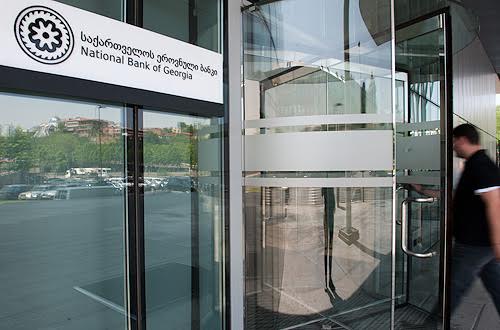| PM Comments on Controversial Banking Supervision Bill |
| Civil Georgia, Tbilisi / 29 Jun.'15 / 14:36 |

A man enters into office of the Georgian National Bank in Tbilisi, June 29, 2015. Photo: Eana Korbezashvili/Civil.ge
President Giorgi Margvelashvili’s opposition to a bill that would strip the central bank of supervisory functions of financial institutions and transfer them to a separate agency, is “incomprehensible” and, if vetoed, the GD parliamentary majority will override it, PM Irakli Garibashvili said.
The bill, which has faced a chorus of criticism from the President, international financial institutions, business associations, opposition parties and a group of civil society organizations, was passed with its first reading by the Parliament on June 27.
“Initially this bill has caused concerns of the International Monetary Fund, Asia Development Bank, EBRD, the World Bank and of those international organizations with which the Georgian government is cooperating for years already,” the PM said in an interview with the Georgian tabloid Asaval-Dasavali, published on June 29. “These are very important organizations for us and we are interested in further deepening of relations with them. So we explained to these organizations that our goal is not to politicize the National Bank of Georgia [NBG], on the contrary, our goal is to depoliticize it.”
“Our friends, international organizations gave us very useful advice and I am glad that our parliamentarians shared these recommendations,” he added.
The International Monetary Fund (IMF); European Bank for Reconstruction and Development (EBRD); Asian Development Bank (ADB), and the World Bank have called for keeping banking supervision inside the National Bank of Georgia (NBG).
These international financial institutions laid out their concerns in details in a joint letter to PM Garibashvili and Parliament Speaker Davit Usupashvili on June 24, saying that “in Georgia’s case, moving banking supervision out of the NBG does not seem prudent.” But the letter also says that if the authorities were “determined” to move forward with the bill, it would be crucial to address concerns outlined in the letter.
President Margvelashvili has indicated that he would veto the bill, which has yet to be approved by the Parliament with its second and third readings. President’s office, which has criticized the bill for lacking any reasonable “professional argument”, also notes that the way how the bill was developed violates Georgia’s commitments under the Association Agenda with the EU as the legislation related to the central bank is being amended without prior consultations with experts from the EU and the European Central Bank.
“As far as President and his economic adviser [Giorgi Abashishvili, a staunch opponent of the bill], it is completely incomprehensible for me why they have such a categorical stance against removing supervision of commercial banks from the National Bank. Their position triggers many question marks,” PM Garibashvili said.
“If the President vetoes the bill, the Parliament will mobilize itself to override the veto – as it happened in previous other cases of presidential vetoes – and the presidential veto will be overturned,” he added.
The ruling Georgian Dream coalition holds 86 seats in the legislative body; at least 76 votes are needed to overturn a presidential veto.
